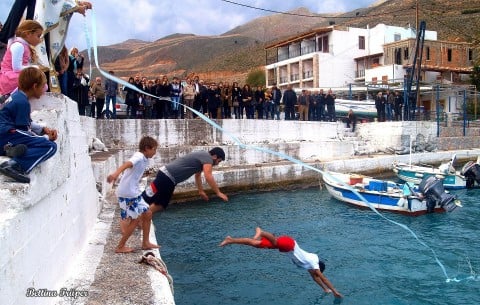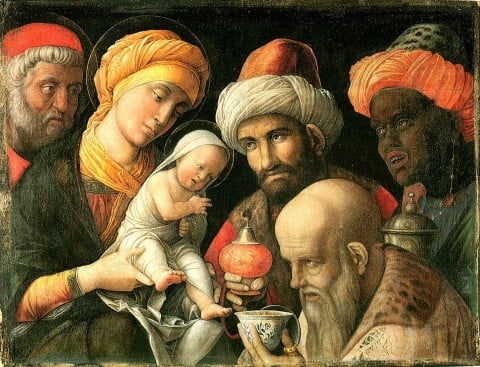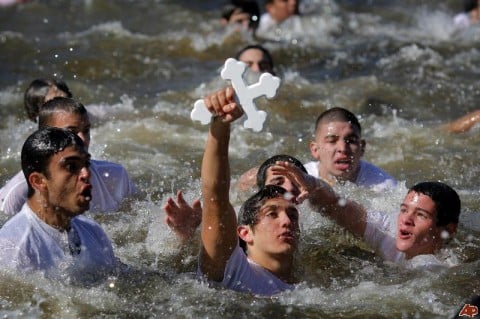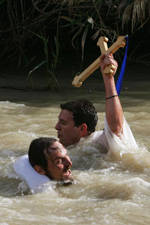Remembering back as a child in San Diego, on this day we would attend church for the Epiphany services then head down to the bay for the annual cross diving event.
Here, many of the young kids, mostly boys, would dive in the ocean once the priest threw the blessed cross into the very cold waters of January. Brrrrrrrr!
The person who retrieves the cross has good luck for the entire new year. The day is spent celebrating the holiday with traditional foods and breads with family and friends. The Saint Spyridon Greek Orthodox Church in San Diego, has an epiphany video of the diving of the cross from last year’s event shot by Greg Balourdas M.D.
The Greek Tradition
On the stroke of January 6th, the “twelve days” of Christmas officially come to an end. This day, takes on a special meaning in Greece. Here, there is a special ceremony of blessing the waters and of the vessels that ply them.
The modern observance at Piraeus, the ancient port of Athens, takes the form of a priest hurling a large crucifix into the waters. Young men brave the cold and compete to retrieve it. These days, the cross is generally attached to a nice, safe long chain, just in case that year’s crop of divers is something less than desired.
After the diving, local fishermen bring their boats to be blessed by the priest.
What does all this have to do with Christmas? Orthodox belief says that it was the day of the baptism of Jesus, and that this is where the day’s association with water arises.
Here’s a nice description of what this day means to many people and religions around the world from TimeandDate.com.
Importance of the Holiday!
Epiphany is commonly known as Twelfth Night, Twelfth Day, Three Kings’ Day, or the Feast of Epiphany. It means “manifestation” or “showing forth”. It is also called Theophany (“manifestation of God”), especially by Eastern Christians. Epiphany refers not only to the day itself but to the church season that follows it – a season that has a varied length because it ends when Lent begins, and this depends on the date of Easter.
It commemorates the first two occasions on which Jesus’ divinity, according to Christian belief, was manifested: when the three kings (also known as wise men or Magi) visited infant Jesus in Bethlehem, and when John the Baptist baptized him in the River Jordan. The Roman Catholic and Protestant churches emphasize the visit of the Magi when they celebrate the Epiphany. The Eastern Orthodox churches focus on Jesus’ baptism.
Epiphany is one of the oldest Christian feasts. It was celebrated since the end of the second century, before the Christmas holiday was established. Like other Christian seasons, the church appropriated Epiphany from an old pagan festival. As early as 1996 BCE, the Egyptians celebrated the winter solstice (which then occurred on January 6) with a tribute to Aeon, the Virgin. It is important to note that the holiday was established prior to the Gregorian calendar’s introduction.
What do people do?
January 6, which is 12 days after Christmas in the Gregorian calendar, marks not only the end of the Christmas holidays but also the start of the Carnival season, which climaxes with Mardi Gras. In some European countries, such as the Czech Republic and Slovakia, children dress as the three kings and visit houses. In their roles as the kings, or wise men, they sing about the Jesus’ birth and pay homage to the “king of kings”. They are rewarded with praise and cookies.
Dia de los Reyes Magos is the Latin American celebration of Epiphany. In many Latin American countries, it is the three wise men and not Santa Claus who bring gifts for children. Children write letters to the wise men telling them how good they were and what gifts they want. In France Le Jour des Rois (the Day of Kings), sometimes called the Fête des Rois, is celebrated with parties for children and adults. The galette des rois, or “cake of kings”, highlights these celebrations. This cake is round and flat, cut into the pantry, covered with a white napkin and carried into a dining room.
Children in Spain fill their shoes with straw or grain for the three kings’ horses to eat and place them on balconies or by the front door on Epiphany Eve. The next day they find cookies, sweets or gifts in their place. The “three kings” make an entry in many cities in Spain on Epiphany Eve, accompanied by military bands and drummers in medieval dress.
This information came from aboutme.com.
© 2013 – 2019, Mary Papoulias-Platis. All rights reserved.











{ 2 comments… read them below or add one }
This is so interesting. I never heard of the epiphany holiday. So, did YOU dive in the ocean this January?!!
No, but my brothers and cousins did! Way too cold for me!